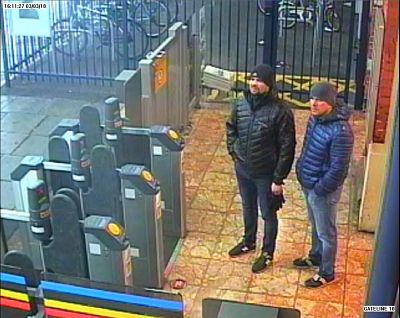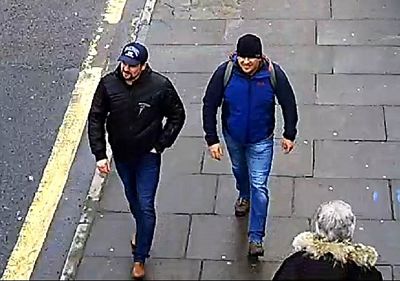Experts immediately dismissed the claims as absurd.
LONDON — It was an in-and-out trip. Alexander Petrov and Ruslan Boshirov were in the United Kingdom for less than 60 hours when, according to British officials, they poisoned ex-spy Sergei Skripal and his daughter with a rare nerve agent.
 ADVERTISEMENT
ADVERTISEMENT
 ADVERTISEMENT
ADVERTISEMENT
During that brief time the alleged Russian intelligence officials managed two trips to Skripal's small hometown of Salisbury — one apparent reconnaissance mission, and a second time to carry out the attempted murder, police say.
On Thursday, more than six months after the major incident that heightened tensions between Russia and the West, Petrov and Boshirov appeared in public for the first time and said there was an innocent explanation for their quick trip to the U.K.: they came as tourists.
"Our friends had been suggesting for a long time that we visit this wonderful town," Petrov said in an interview with Kremlin-funded broadcaster RT.
"There's the famous Salisbury cathedral, famous not only in Europe but in the whole world," Boshirov added. "It's famous for its 123-meter spire, it's famous for its clock — one of the first ever created in the world that's still working."
Asked why they appeared nervous, Boshirov replied that this was because of the worldwide attention they had received.
"When your life is turned upside down in just one moment, in just one day it changed our lives," he said.
NBC News security analyst Duncan Gardham, among others, immediately dismissed this explanation as absurd.
"With this brazen circus, the Russian state is saying once again, 'We did it,'" he said. "Their lips move, words come out, but it is the action of putting these men forward that sends the message that Putin is proud of what they did."
The U.K. has been here before. In 2006, two Russians allegedly poisoned former spy Alexander Litvinenko in the British capital. An inquiry later found that President Vladimir Putin was "probably" behind the attack; one of the alleged assassins, Andrei Lugovoi, is now a lawmaker in the Russian parliament.
Sergei and Yulia Skripal were poisoned in March with the Russian-made nerve agent Novichok. They later recovered but two apparent bystanders, Dawn Sturgess and Charlie Rowley, became sick after coming into contact with the discarded container used in the attack. Sturgess later died.
British officials say they have identified the men as officers from Russia's military intelligence service, the GRU. Their names are believed to be aliases.
Prosecutors said earlier this month they they have enough evidence to charge the men with crimes including attempted murder. However, Russia does not extradite its own citizens and, like with Litvinenko's alleged killers, there is little chance they will ever face justice.
"This was not a rogue operation," Prime Minister Theresa May told lawmakers earlier this month. "It was almost certainly also approved outside the GRU at a senior level of the Russian state."
During their interview with RT, the pair denied this, instead saying they were in the sports-nutrition business. They also denied carrying the fake Nina Ricci perfume bottle in which investigators say the Novichok was transported.
"Isn't it silly for decent lads to have women's perfume?" Boshirov told RT. "The customs are checking everything, they would have questions as to why men have women's perfume in their luggage. We didn't have it."
If they were in Salisbury on a tourist visit they didn't stay long.
They flew from Moscow to London on Friday, March 2. The next day they took the train to Salisbury, around 80 miles outside of London, but stayed less than two hours, a likely recon mission according to police.
The took the same journey again Sunday. That's when police said security-camera footage placed them in the immediate vicinity of the Skripals' home just before noon.
They soon left and were back in London by 4 p.m., boarding a flight back to Moscow later that night.
They told RT they planned to stay longer and see other attractions but their trip was cut short by bad weather.
"We lasted for only half an hour because it was covered in snow," Petrov said.
"Of course, we went there to see Stonehenge, Old Sarum," he added, referring to two English archaeological sites, "but we couldn't do it because there was muddy slush everywhere. The town was covered by this slush. We got wet, took the nearest train and came back" to London.
Boshirov added a different explanation — they fell victim to bad railway connections.
"We spent no more than an hour in Salisbury, mainly because of the lags between trains," he said. "Maybe we did [unwittingly approach] Skripal's house, but we don't know where is it located."












